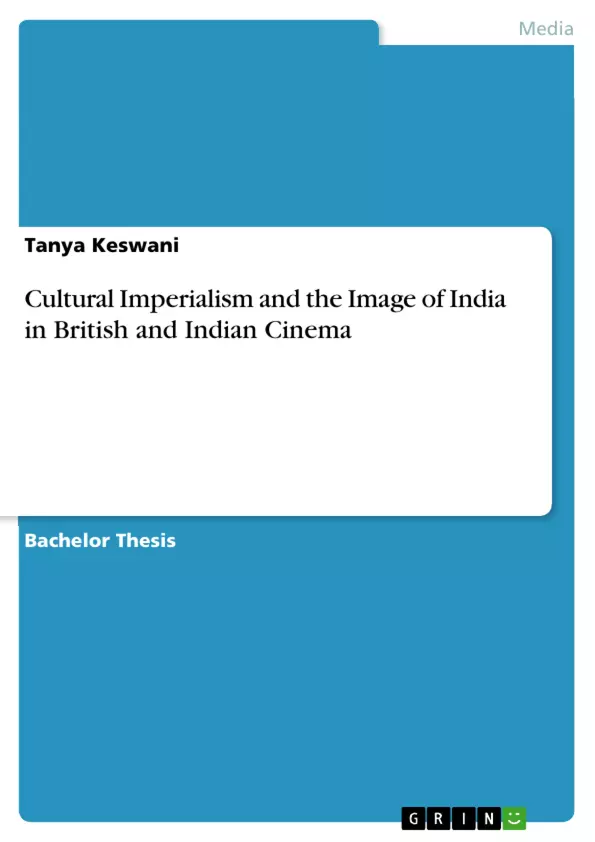This dissertation endeavors to examine the existence of cultural imperialism in 21st century film on India. Evaluating two films, the British film "Slumdog Millionaire" and the Indian film "Swades", this study attempts to consider both perspectives of the ‘other’.
A subordinate representation of Indian education, culture and women in "Slumdog Millionaire" continues the imperial attitude towards India. Although signs of a national culture are present in the film "Swades", the Indian film also contributes to the existence of cultural imperialism. This is done by sustaining the imperial attitude through representations of alienation towards the Indian identity. Scholars Edward W. Said and Gayatri Spivak help in the analyses of subordinate representation in the British film. Similarly, Ngugi Wa Thiong’o and Frantz Fanon form the basis for the analyses of alienation and national culture in the Indian film. Although varying in opinion, these authors have come together in this study to highlight the presence of cultural imperialism in contemporary films on India.
Inhaltsverzeichnis (Table of Contents)
- ABSTRACT
- INTRODUCTION
- CHAPTER ONE Cultural Imperialism As a Postcolonial Concept
- CHAPTER TWO British Cinema The subordinate representation of India.….….….….….….….….….…..\n .11
- 19th Century Description of Subordination.......\n .11
- Continuation of the Imperial Attitude .\n .12
- 21st Century Representations of Subordination
- Representation of Education and Culture
- Representation of the Indian Woman.........\n .17
- Cultural Imperialism in Contemporary British Cinema..........\n .19
- CHAPTER THREE Indian Cinema: Alienation From one's identity..\n ..20
- Sustaining the Imperial Attitude............\n ..20
- Representation of Annihilation in Swades\n ..22
- Representations of National Culture............\n ..23
- Cultural Imperialism in Contemporary Indian Cinema\n ..25
- CONCLUSION
Zielsetzung und Themenschwerpunkte (Objectives and Key Themes)
This dissertation aims to investigate the presence of cultural imperialism in 21st-century films about India. By examining two films, the British film Slumdog Millionaire and the Indian film Swades, the study seeks to explore both perspectives of the 'other'.
- The continuation of the imperial attitude towards India in contemporary films
- The representation of subordinate Indian culture and women in British cinema
- The portrayal of national culture and alienation from Indian identity in Indian cinema
- The role of cultural imperialism in shaping the representation of India in film
- The analysis of cultural imperialism through the lens of postcolonial theory
Zusammenfassung der Kapitel (Chapter Summaries)
Chapter One introduces the concept of cultural imperialism as a postcolonial phenomenon, outlining its historical context and theoretical framework. It explores the idea of cultural imperialism as a continuation of a constructed imperial attitude and examines how it manifests in contemporary films on India.
Chapter Two delves into the representation of India in British cinema. It focuses on the portrayal of subordination, particularly in the film Slumdog Millionaire. The chapter analyzes the depiction of education, culture, and the Indian woman, demonstrating how these representations continue the imperial attitude towards India.
Chapter Three shifts its focus to Indian cinema, examining the phenomenon of alienation from one's identity in the film Swades. It explores how Indian cinema, despite its nationalistic themes, sustains the imperial attitude through representations of cultural annihilation and the lack of a strong national culture.
Schlüsselwörter (Keywords)
Cultural imperialism, postcolonial theory, Indian cinema, British cinema, representation, subordination, alienation, national culture, identity, Slumdog Millionaire, Swades, Edward W. Said, Gayatri Spivak, Ngugi Wa Thiong'o, Frantz Fanon.
Frequently Asked Questions
What is cultural imperialism in the context of cinema?
It refers to the continuation of colonial attitudes and the subordinate representation of a culture, in this case, India, in contemporary films.
How does the film "Slumdog Millionaire" represent India?
The study argues that the film portrays Indian education, culture, and women in a subordinate way, continuing an imperial perspective.
Does Indian cinema also contribute to cultural imperialism?
Yes, the film "Swades" is analyzed as contributing to cultural imperialism by representing alienation from Indian identity, despite its national themes.
Which scholars are used to analyze these films?
The analysis is based on the theories of Edward W. Said, Gayatri Spivak, Ngugi Wa Thiong’o, and Frantz Fanon.
What is the main objective of this dissertation?
To examine the presence of cultural imperialism in 21st-century films about India from both British and Indian perspectives.
- Quote paper
- Tanya Keswani (Author), 2013, Cultural Imperialism and the Image of India in British and Indian Cinema, Munich, GRIN Verlag, https://www.grin.com/document/539657



